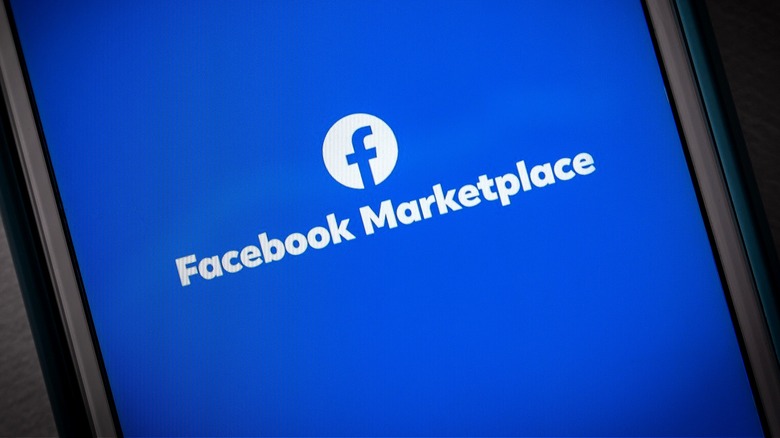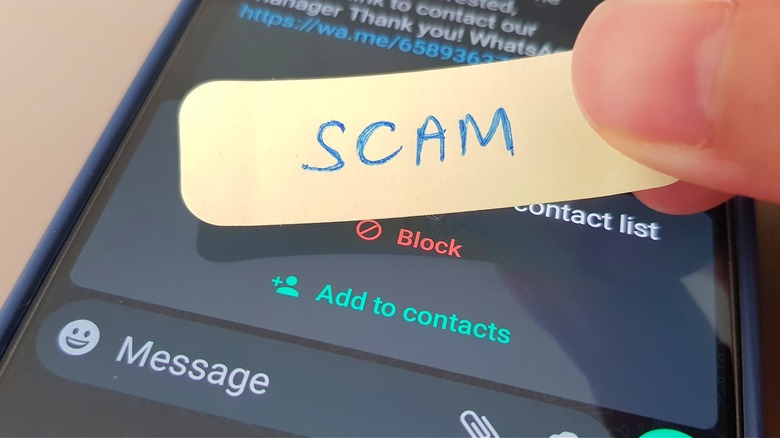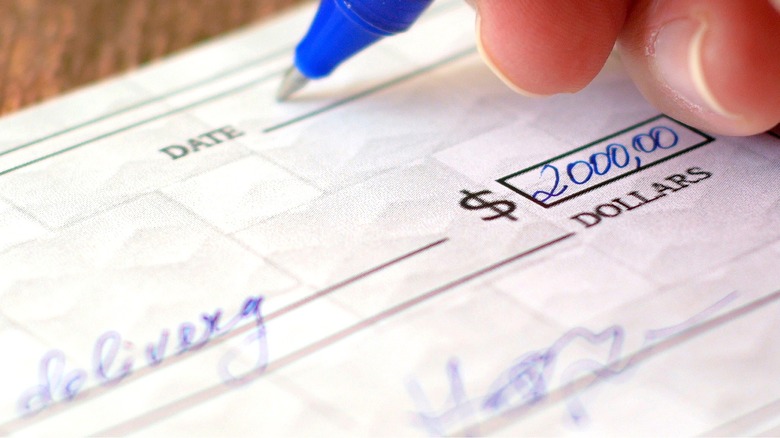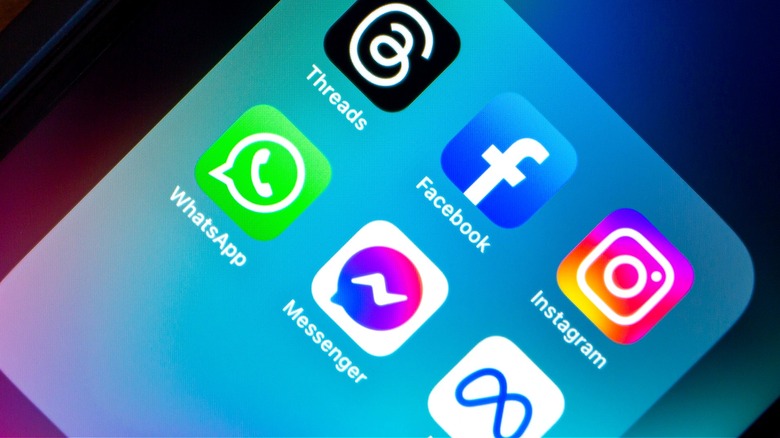Telltale Signs Of Facebook Marketplace Scams To Watch Out For
Within five years of launching Facebook Marketplace in 2016, Meta reported in early 2021 that the e-commerce platform had reached 1 billion monthly users. Suffice to say, it's become a destination for people to discover, buy, and sell their gently used items locally in their community (though items can also be shipped nationwide). Unfortunately, the rapid growth of Marketplace has also attracted scammers trying to trick people out of their money or identity. However, many of these scams, such as those involving counterfeit items or bait-and-switch, aren't unique to Marketplace. So, so long as you stay vigilant for telltale signs of a scam, you should be able to guard against getting cheated.
As the Federal Trade Commission warns consumers, anytime you have a situation where people are selling items online, crooks will try to take advantage. If you encounter a possible scam on Facebook Marketplace, report the listing and/or buyer or seller to Facebook and help the community as a whole — specifically, the scammer's next unsuspecting victim. The FTC also requests you report the fraud to ReportFraud.ftc.gov. That said, here are some scam signs and red flags to watch for the next time you're browsing Marketplace for a unique find, or posting your own secondhand items for sale.
The deal is too good to be true
There are many things you should never buy brand new if you want to save, which is where online outlets like Facebook Marketplace enter the picture. With so many users, the chances are pretty good you can find what you're looking for at a bargain price. Or, perhaps the item isn't even in production any longer, so the only way to get it is from someone who's willing to part with theirs. In either case, you're looking for a deal. This said, if the price sounds too good to be true, it likely is, and your cue that it's a Facebook Marketplace scam.
Counterfeit items, especially designer items like handbags and clothing, unfortunately, are all too common on a platform like Marketplace, where people can list items for free. If you come across a listing for an item you know through your research should cost a good deal more if authentic, then it's smart to be wary. If local, you could ask to see it in person. But, if the seller refuses, or it's not possible to inspect it yourself, then it's best to walk away from this one. While it's always possible with low prices that the seller is unaware of what they have, it's less likely than it being an actual scam.
Photos are from a retail or stock photography site
Another sign of a Facebook Marketplace scam is if the listing only shows images of the item from the original site. In such cases, request additional photos. If the seller sends even more from a retail site or clearly pulls the images off the internet (note: do your own Google Image search), then you can assume it's a Marketplace scam. As with counterfeits, it's important to authenticate whatever is being sold in a listing, which you can try doing through photo requests or a video call, where you'll be able to see the item live. In the case of electronics, such as a phone or laptop, it's best to meet in person, like at a coffee shop, so you can use an outlet and turn the device on to verify it works.
Also beware of any Marketplace listing where the image looks like it's a stock photography image. This also applies to fake rentals. Unfortunately, scammers will post a property for rent but have no right to do so. Meanwhile, they'll request a deposit to secure the unit or ask that you fill out a rental application that'll require you provide personal and private information — a clear setup for identity theft. For rental listings, confirm the property is available by reaching out to the property's manager. You could also request to tour the rental before moving forward, which a scammer won't be able to accommodate and likely will end up ghosting you, at which point it's time to report them and their listing to Facebook and the FTC.
The payment requests are suspicious
If you've gotten to the point in your Facebook Marketplace interaction where it's time to pay for the item in question, but the seller requests you pay them in gift cards for a specific retailer, accompanied by a (prepared) story explaining why this would be preferable over a money payment, then this is a gift card scam and you should cease your communication with this person. Legitimate sellers won't ever ask to be paid in gift cards or in another convoluted way. Further, never provide details about a gift card, like its claim code.
As a seller on Marketplace, meanwhile, never accept a receipt from a buyer indicating they've sent you payment. Confirm this on your end through the payment method used, such as PayPal. Facebook advises to use a secure person-to-person payment site like PayPal, which is protected, or to send and receive money through Facebook Messenger. If a buyer insists on paying with a cashier's or certified check, make sure the check clears before handing over/shipping your item. For buyers, never use a payment link provided by a seller.
The buyer purposely overpays you for an item
This sign of a Facebook Marketplace scammer is specific to sellers on the e-commere platform. If a buyer writes you a check and, for some reason, overpays you for the item and requests you send them the difference, this is obviously a scam. Some may try and do so through a peer-to-peer payment app as well. Unfortunately, it's a scam scammers continue to try and pull off, with stories of writing in the wrong amount or sending more to cover any fees involved in shipping the item out to them — only to then ask for the money back because of urgent reasons. If you receive payment and it's more than the amount you expect it to be, don't accept it.
According to the FTC, not only will you lose the difference from the overpayment — if you were to refund them before the check or digital payment actually clears — but you'll also lose your item after shipping it out (or handing it over in person). Further, if it's a check, you'll also be on the hook for the full amount and any bank fees once the check is proved to be fake. So the takeaway is, when selling on Marketplace, only accept the correct amount as payment. Anytime a buyer tries to pay you more, it's a clear red flag this person is working on a scheme.
The other party wants to communicate outside of Facebook
For your protection as a buyer or a seller on Facebook Marketplace, it's important to never agree to take communication off of Facebook. As Facebook explains per the website's shopping safety page, "Having a record of your conversations will be helpful in case there is a problem with the purchase or payment later." Further, taking your communication off of Facebook could leave you vulnerable to future phishing attacks via text messages, email, etc. In other words, keep your communication with Facebook's channels, like Messenger, and if you believe you're dealing with a scammer, report the user/incident to Facebook and help protect others.
As for payment, Marketplace has Facebook Checkout, an alternative to arranging a transaction. If you use Facebook Checkout (simply, tap "Buy now" on the listing), your transaction will be covered under Facebook's Purchase Protection policies, which include refund requests. There is no fee for buyers to pay for an item with Checkout.





